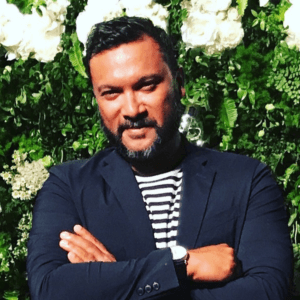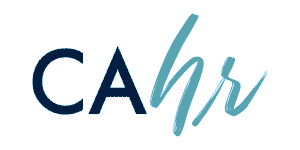Afdhel Aziz at CAHR18: Loving Your Work in the 21st Century
Work is called the daily grind for a reason. Rarely is personal development or cultivation of a passion the reason we get out of bed each day. Most Americans are motivated to clock in by impending bills because, well, financial reimbursement tends to be the most significant reward we get in exchange for our time and effort.
 Now, imagine a workforce driven by a sense of personal fulfillment and confirmation that their work was positively impacting the world. This is what Afdhel Aziz, author, marketing expert, and Chief Creative Officer at Conspiracy of Love, a social impact consultancy, wants to see in our future. We asked Afdhel to share his ideas about finding purpose in your work in the 21st century (and why corporations should care if their employees are engaged or not) in advance of his keynote appearance at the 2018 California HR Conference. He also touches upon why HR is critical to raising the bar in employee engagement.
Now, imagine a workforce driven by a sense of personal fulfillment and confirmation that their work was positively impacting the world. This is what Afdhel Aziz, author, marketing expert, and Chief Creative Officer at Conspiracy of Love, a social impact consultancy, wants to see in our future. We asked Afdhel to share his ideas about finding purpose in your work in the 21st century (and why corporations should care if their employees are engaged or not) in advance of his keynote appearance at the 2018 California HR Conference. He also touches upon why HR is critical to raising the bar in employee engagement.
Reserve your spot at CAHR18 to hear Afdhel’s eye-opening presentation live! Catch the Standard prices before they end on July 31st.
Changing times for corporations.
CAHR: Your book Good is the New Cool has been described as the new business model for the 21st century. Why does the 21st century need a new business model? And for those unfamiliar with your work, what does it mean for “good” to be the new “cool?”
Afdhel Aziz: Capitalism was created to serve the needs of the shareholder and maximise profit; but what we are seeing in the 21st century is a new form of capitalism that serves the need of a wider group of stakeholders, including consumers, society and the planet.
Equally, when it comes to the field of brands, we believe that today it is just as important for a brand to be ‘good’ as it is to be ‘cool’: the brands like Tesla, Airbnb and Adidas who are doing that are the hottest brands in the world.
CAHR: You’ve said that without individuals discovering their personal purpose in work, organizational purpose is meaningless. What can HR do to identify and support this connection between personal and organizational purpose? What can an individual do to connect their personal purpose with their organization’s?
Afdhel: I believe this is the biggest question facing HR today and the one that can unlock the most human potential. Every employee wants to get paid fairly, be treated well and do work that can ladder up to a higher social or environmental purpose.
The role of HR is to be the bridge between a companies overarching purpose – and helping people find their own. The work we do with my consultancy Conspiracy of Love for instance, helps run one-day workshops where we can help high performing teams unlock their own purpose using the GPS model: what are your Gifts, what are your Passions, and how can you be of Service? We can then use this a stepping stone to find ways to deeply connect it to the purpose of the company.
Using the right approach.
CAHR: Brands with purpose like Tesla, Warby Parker, and Toms are known nationally for their impact locally and globally, but the majority of companies in the U.S. don’t have “social impact” in their DNA and opt for a more traditional or even non-existent engagement with issues outside of their business.
What advice would you give to HR professionals wanting to approach the c-suite (or even for a CHRO in the c-suite) to propose connecting the company and employees to a bigger purpose? What information do they need? Why is it worth bringing up?
Afdhel: Gallup did a poll which showed that globally only 15% of employees are happy and engaged at work – they called it a ‘shocking waste of talent’ and I agree. Think about how much more productive companies would be if they could engage the 85% who are not engaged: our thesis is that by giving people meaningful work you can increase the level of engagement.
All the data shows that purpose-driven companies outperform their competition on every metric – share price,brand value, reduced turnover, higher productivity. The way to frame it is not to think about in terms of ‘Corporate Social Responsibility’ but rather ‘Corporate Social Opportunity’ : purpose is a competitive edge that can help businesses future proof themselves to retain the best talent (especially Millennials and Gen-Z who are now entering the workforce) and create businesses that are sustainable for the long term.
Finding a way.
CAHR: We are deeply inspired by how you took the opportunity to re-align your life and work with a greater purpose after witnessing the devastation in Sri Lanka following the 2004 tsunami. Part of your process was quitting your job. What is your advice for those of us wanting to reckon with (or find) our purpose in work, but don’t have the option to quit? What is your advice to those of us who are buried in work and can’t seem to stay offline even when we’re on vacation?
Afdhel: One of my favorite quotes is that ‘Purpose is built not found’. Everyone can find ways to experiment in small ways to do more meaningful work. Everyone has access to small budgets, and can find ways to beta test purpose in their life. Partner up with someone else at work who feels the same way as you do and together you can become allies. You dont have to quit your day job to find purpose!
And unplugging and having time to step back and look at the trajectory of your life is crucial. Too often we sleepwalk through our lives, distracted by a constant stream of social media and daily mundanity: if you can’t see the bigger picture, you could be destined to spend a life where you wake up at the end and go ‘what was my legacy’? And not have something you could be proud of. Thats why its important to constantly course-correct and refine what you do for a living.
Mindset matters.
CAHR: “Think Transformational, not transactional” is a mantra of yours. What does this mean to you, and how could this apply to the HR community?
Afdhel: We are at a moment where there is an age of enlightenment happening. People are valuing experiences over things, meaning over money, and are more aware of their potential to either hurt or help society than ever before. At the same time, technology has given us a golden opportunity to unleash human potential on a massive scale. Now is the time to marry the two things and think in a really transformational way about the HR community could be the gateway to help many people find their purpose.
CAHR: What are you most excited for HR professionals to take away from your talk?
Afdhel: I want the HR community to think about re-framing what they do: from being managers of ‘resources’ to becoming liberators of ‘human potential’’: the single largest force for good in the world is sitting inside corporations, all too often watching the clock, and waiting out the day in their cubicles. At the same time we are more aware then ever about the state of the world and all the many challenges that face us: from safe neighborhoods, to good schools, to economic opportunity, to a safe and clean planet for everyone.
HR has the potential to be the transformative change agents inside corporations to unleash this human potential – and help change the world for the better.
-Afdhel Aziz
We can’t wait to hear Afdhel at CAHR18 in August, and we hope you’ll join us! Registering to attend is super easy and you can still save $50 with Standard prices until July 31st.
Invest in your career and yourself!

